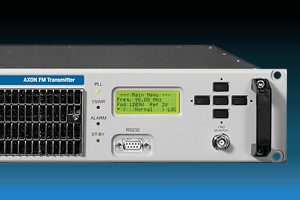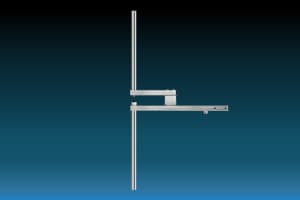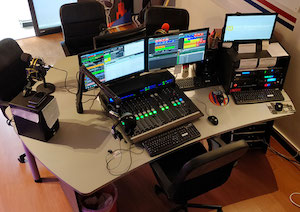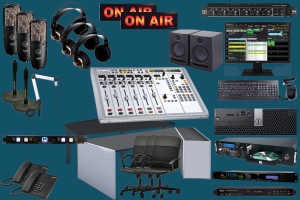LIGHTNING
ANALOG RADIO MIXER WITH USB AND BLUETOOTH
Audioarts Lightning strikes that perfect balance between analog and digital.

Audioarts Lightning combines the best in a standalone console with the latest in modern
conveniences such as USB and Bluetooth® connectivity.
Lightning comes in 12- or 16-channel tabletop configurations and has a
modular design with four channel input panels, and a Master/Monitor panel
with linear faders for headphone and control room level control. All
faders are conductive plastic and all switches are LED illuminated. Input
channels have A/B source selection, with balanced line in for the A source
and trimmable -10 to +4 line in on B. Standard features include four
stereo program busses, two auto mix-minuses for call-ins, four mic preamps
with variable gain trim and switchable +48V phantom power, plus built-in
headphone jack and CUE speaker amplifiers. Additional four channel mic
preamp cards can be fitted if needed.
Lightning is designed for studios that have mostly microphone or analog
source inputs, and where a lot of studio routing isn’t required. It
doesn’t have the extensive A/D, D/A conversions of a typical digital
board, yet you have access to editing software, Skype or other external
sources through USB and Bluetooth.
USB and Bluetooth onboard connectivity is useful for playing audio
directly from a PC or to output audio to edit in VoxPro or other recording
software, as well as receive and record calls from Bluetooth enabled
cellphones or play cuts from MP3 players.
The console also contains a patchable AES input for connecting a digital
source to any fader, and built-in A/D conversion for the main program
output so operators can access the Program Air feed as balanced analog,
AES3 digital, or both simultaneously.
While it looks and feels like its Wheatstone cousins, this
digitally-enabled analog console operates as a full standalone board.
Cue thunderous applause.
FEATURES
- Mainframes can be loaded with 12 or 16 inputs and always include two phone channels for trouble-free remotes and call-ins
- Two USB inputs/outputs
- Bluetooth connectivity
- AES input for connecting a digital source to any fader
- Three VU meter pairs—PGM 1 and 2 plus SWITCHED
- Four stereo program busses with balanced outputs (switchable stereo or mono mode)
- Four high performance mic preamps with +48V phantom power and variable gain trims to precisely match your microphones (with the option to add additional four-preamp modules)
- Electronic switching
- LED illumination
- Compact tabletop-mount frame
- Built-in cue speaker can automatically interrupt your main stereo monitors
- Split cue
- Headphone jack with built-in amplifier
- Built-in A/D conversion for digital or analog program out
- Two external inputs feed the monitor section (for live or pre-delay air monitoring)
- RJ-45 connectors for low-cost wiring
- Balanced or unbalanced inputs/outputs for consumer or professional grade equipment
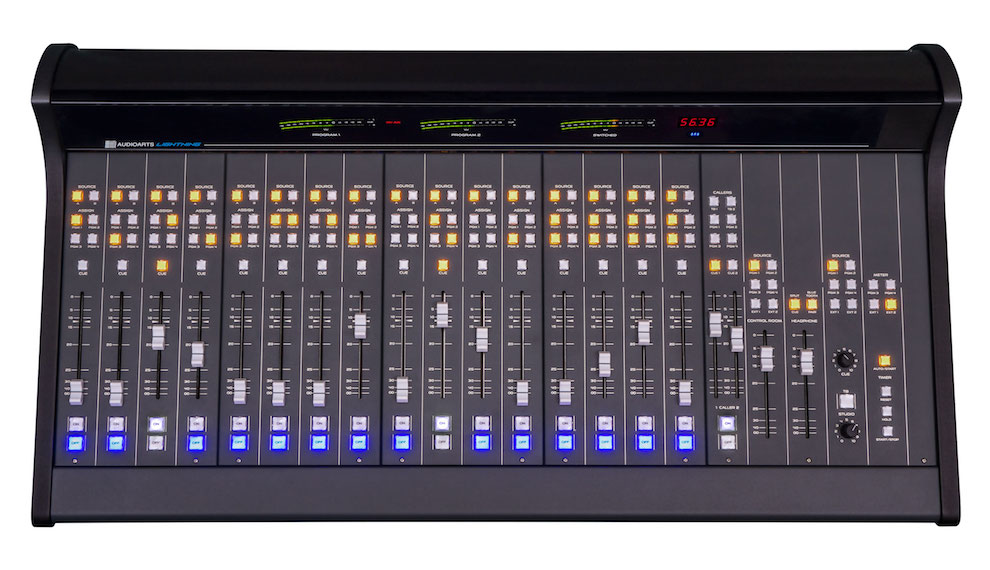
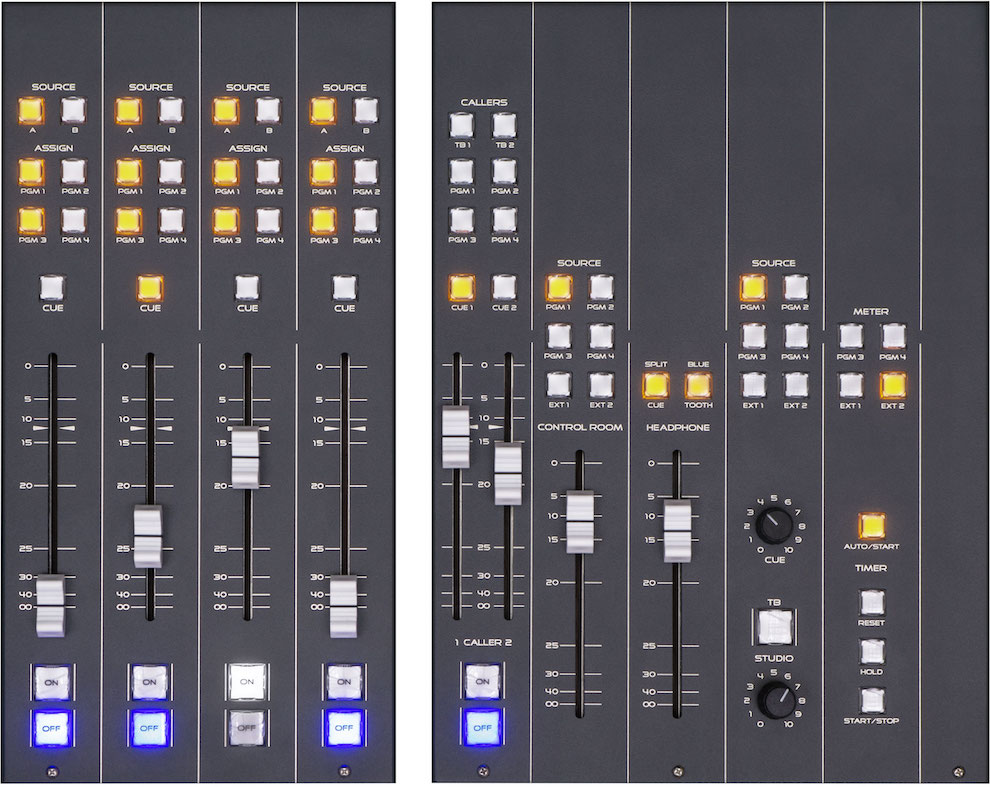
Input section
SOURCE SELECT: Selects between two analog stereo sources: A and B
PROGRAM ASSIGN: Assign the selected source signal to any combination of
the console’s four stereo Program outputs
CUE: Button Places the channel’s signal on the console’s cue bus.
FADER: Sets the channel’s level.
ON/OFF: Buttons Turns the channel on and off by means of electronic
switching and can simultaneously start external source machines.
Caller Input section
TB Buttons: When the TB switch is pressed (it is momentary action), Mic
1 will interrupt the regular caller signal, allowing the DJ to talk to the
caller prior to airing.
PROGRAM ASSIGN: Output switches assign the caller to any combination of
the console’s four PROGRAM outputs and permit live talk-ins.
CUE Buttons: Allow interviewing the callers prior to airing by including
the caller’s voice on the console’s cue bus, where it may be heard by the
operator.
FADER: Sets the caller’s signal level.
ON/OFF Buttons: Determines if the phone channel is ON or OFF.
Control Room Section
SOURCE PGM 1/PGM 2/PGM 3/PGM 4: Pressing one of the four program
switches sends the selected output bus to the console’s control room and
headphone outputs.
SOURCE EXT Switches: Pressing the EXT switches allows the operator to
monitor external inputs (useful for items like recorder playbacks or air
returns).
CONTROL ROOM Level Control: Determines the overall loudness of the signal
being monitored on the Control Room speakers.
SPLIT/CUE Switch: Sends the cue signal to the left headphone channel,
while the right continues to monitor the selected control room source.
BLUETOOTH Switch Turns Bluetooth on or off.
HEADPHONE Level Control: Determines the overall loudness of the headphone
output signal.
SOURCE PGM 1/PGM 2/PGM 3/PGM 4: Sends the selected output bus signal to
the Studio Monitor speakers.
SOURCE EXT Switches: Send the selected external signal to the Studio
Monitor speakers.
CUE Level Control: Determines the overall loudness of the cue signal being
sent to the console cue speaker.
TB TO STUDIO Button: Lets the operator’s microphone signal interrupt the
normal feed to the studio speakers, allowing the operator to talk to the
performers in the Studio.
STUDIO Level Control: Determines the overall loudness of the signal being
sent to the STUDIO Monitor speakers.
METER Buttons: Select the source for the switched meter pair.
TIMER AUTO/START: Automatically starts the timer when a programmed channel
ON switch is pressed.
TIMER RESET: Resets timer.
TIMER HOLD: Pauses timer.
TIMER Start/Stop: Manually starts or stops timer.
Rear Panel


Opening the console’s hinged meterbridge reveals panel trimpots and programming dipswitches, plus connector maps calling out rear chassis input/output RJ-45s.
Power Supply

Clean and proper power is key to the great performance you’ve come to expect from Audioarts. It would be easy to just purchase over-the-counter power supplies for our Lightning console. But we don’t. In order to maintain our high level of quality we’ve designed and built a dedicated separate rackmount supply - our SPS-202.
SPECIFICATIONS
| AUDIO INPUT | |
|---|---|
| Mic: | - Direct wire plug terminals, balanced |
| - Electronic differential >2KΩ bridging | |
| - Adjustable sensitivity, max. input -4dBu | |
| Line (Caller, External): | - RJ-45 balanced, >10KΩ bridging |
| - +4dBu = 0VU, max. input +28dBu |
| AUDIO OUTPUT | |
|---|---|
| Program & Caller: | - RJ-45 connectors, balanced |
| - Electronic differential, 100Ω source | |
| - Impedance to drive >600Ω | |
| - 0VU = +4dBu, max. output +28dBu | |
| CR & Studio Monitor: | - RJ-45 connectors, unbalanced |
| Headphone: | - Stereo 1/4” TRS connector to directly drive typical broadcast style headphones >200Ω |
| Cue: | - Cue speaker in meterbridge |
| - RJ-45 connector output to drive external power amp |
| LOGIC | |
|---|---|
| On-Air | Low current closure to drive external on-air light relay |
| - Channel Start output | |
| - Remote On input | |
| - Remote Off input |
| PERFORMANCE | |
|---|---|
| Frequency Response: | ±0.2dB 20Hz-20kHz (mic & line) |
| Dynamic Range: | - Line (unity gain): 110dB |
| - Mic (54dB gain): 104dB | |
| Headroom: | 24dB above +4dBu |
| Noise Mic: | -128dB EIN |
| Line: | -86dB ref 0VU |
| THD+N: | - Mic: <0.02%@-50dBu in, +4dBu out |
| - Line: <0.003%@+4dBu in, +4dBu out | |
| Bus Crosstalk: | -117dB @1kHz |
| Stereo Separation: | -86dB @1kHz |
| Off Isolation: | -115dB @1kHz |
| CONSOLE | |
|---|---|
| Dimensions: | - 36.75”/93.34cm wide |
| - 20.125”/51.12cm deep | |
| - 5.375”/13.65cm high (rear) | |
| 1.25”/3.17cm high (front) | |
| Weight: | 30 lbs/13.61kg |
| Shipping Dimensions: | 45”/114.3cm wide |
| 28”/71.12cm deep | |
| 11”/27.94cm high | |
| Shipping Weight: | 42 lbs/19.05kg |
| SPS-202 POWER SUPPLY | |
|---|---|
| AC Power: | 100-240VAC/50-60Hz/50W |
| Dimensions: | 19”/48.26cm wide (rackmount) |
| 1.75”/4.44cm high | |
| 13.25”/33.65cm deep (add 2.25”/5.71cm for rear connectors) | |
| Weight: | 9 lbs/4.08kg |
| Cable length: | 16 ft/4.88m (power supply to console) |
| Shipping Dimensions: | 25”/63.5cm wide |
| 21”/53.34cm deep | |
| 4”/10.16cm high | |
| Shipping Weight: | 11 lbs/5kg |
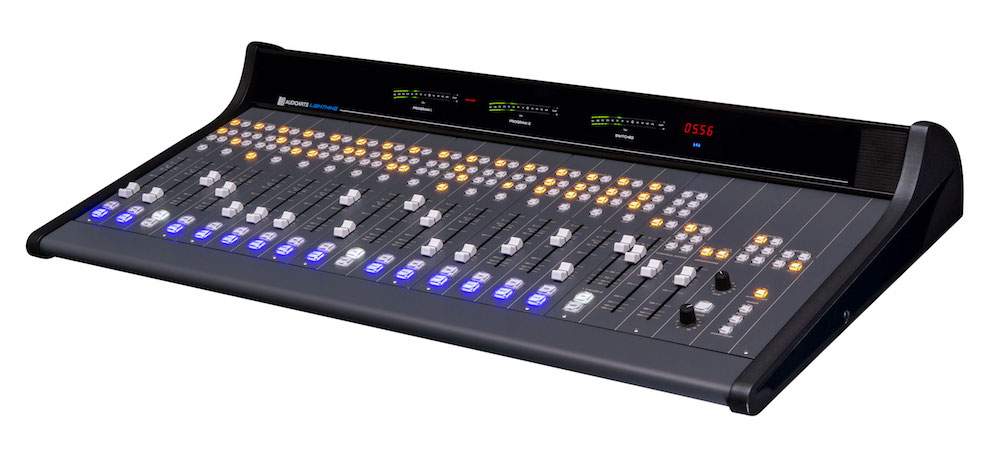
Recommended products
no products avaible
 BACK TO ON-AIR STUDIO
BACK TO ON-AIR STUDIO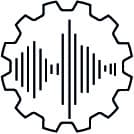 AUDIO INTERFACES
AUDIO INTERFACES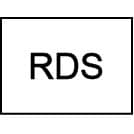 RDS ENCODER
RDS ENCODER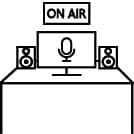 STUDIO ACCESSORIES
STUDIO ACCESSORIES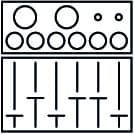 AUDIO MIXER
AUDIO MIXER